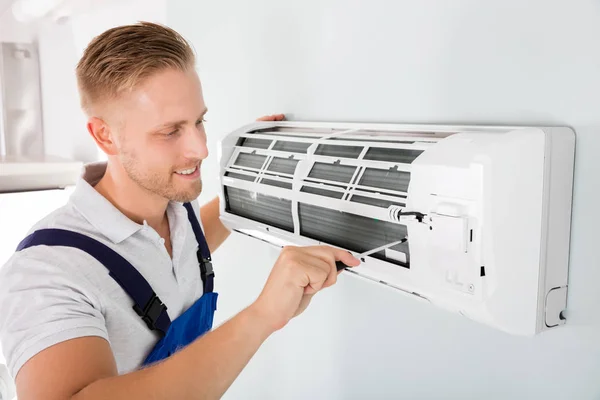Introduction
An air conditioning unit is an essential appliance in modern homes and offices, providing comfort by regulating indoor temperatures and humidity levels. Whether you live in a scorching desert or a humid coastal area, an air conditioning unit can make your living space more bearable and even improve air quality.An air conditioning unit operates on the principles of thermodynamics, using a refrigerant to absorb heat from indoor air and release it outside, notes Clockwork Property Management. The main components include:
In this comprehensive guide, we will explore the different types of air conditioning units, their benefits, how they work, and essential maintenance tips to keep them running efficiently.
How Does an Air Conditioning Unit Work?
An air conditioning unit operates on the principles of thermodynamics, using a refrigerant to absorb heat from indoor air and release it outside. The main components include:
- Compressor – Pressurizes the refrigerant, turning it into a high-temperature gas.
- Condenser Coil – Releases heat from the refrigerant to the outside air.
- Expansion Valve – Lowers the refrigerant’s pressure, cooling it down.
- Evaporator Coil – Absorbs heat from indoor air, cooling it before circulating it back into the room.
This continuous cycle ensures that your space remains cool and comfortable.
Types of Air Conditioning Units
There are several types of air conditioning units available, each suited for different needs and spaces:
1. Window Air Conditioning Units
These are compact and fit into a window frame, making them ideal for single rooms. They are affordable and easy to install but may obstruct window views.
2. Split Air Conditioning Units
Split systems consist of an indoor unit (evaporator) and an outdoor unit (condenser). They are quieter, more efficient, and suitable for cooling multiple rooms.
3. Central Air Conditioning Units
Best for large homes or commercial buildings, central air conditioning units use ductwork to distribute cool air evenly. They offer consistent cooling but require professional installation.
4. Portable Air Conditioning Units
These are movable and don’t require permanent installation. They are great for renters or small spaces but are less efficient than fixed units.
5. Ductless Mini-Split Air Conditioning Units
Similar to split systems but without ductwork, these are energy-efficient and allow for zoned cooling, meaning you can control temperatures in different rooms independently.
6. Smart Air Conditioning Units
These modern air conditioning units can be controlled via smartphones or voice assistants like Alexa or Google Home, offering convenience and energy savings.
Benefits of Using an Air Conditioning Unit
Installing an air conditioning unit provides numerous advantages beyond just cooling:
1. Temperature Control
The primary function of an air conditioning unit is to maintain a comfortable indoor temperature, regardless of outdoor weather conditions.
2. Improved Air Quality
Many air conditioning units come with filters that remove dust, pollen, and other allergens, improving indoor air quality.
3. Humidity Regulation
Excess humidity can make a room feel hotter and promote mold growth. An air conditioning unit helps maintain optimal humidity levels.
4. Enhanced Sleep and Productivity
A cool environment promotes better sleep and increases work efficiency by reducing heat-related fatigue.
5. Protection for Electronics
High temperatures can damage electronics. An air conditioning unit helps maintain a stable environment for computers and other devices.
Choosing the Right Air Conditioning Unit
Selecting the best air conditioning unit depends on several factors:
1. Room Size
The cooling capacity (measured in BTUs) should match the room size. A unit too small will struggle, while an oversized one will cycle too frequently, wasting energy.
2. Energy Efficiency
Look for units with a high SEER (Seasonal Energy Efficiency Ratio) or EER (Energy Efficiency Ratio) rating to save on electricity bills.
3. Noise Levels
If noise is a concern, opt for split or ductless systems, which are quieter than window or portable units.
4. Installation Requirements
Consider whether you need a permanent installation (central or split systems) or a portable solution.
5. Smart Features
If you want remote control and scheduling, a smart air conditioning unit is the best choice.
Maintenance Tips for Your Air Conditioning Unit
To ensure your air conditioning unit runs efficiently and lasts longer, follow these maintenance tips:
1. Clean or Replace Filters Regularly
Dirty filters reduce airflow and efficiency. Clean them every month or replace them every 3 months.
2. Check the Thermostat Settings
Ensure your thermostat is set to an optimal temperature (around 24°C or 75°F) to balance comfort and energy savings.
3. Inspect the Condenser and Evaporator Coils
Dust and debris can accumulate on coils, reducing efficiency. Clean them annually.
4. Ensure Proper Airflow
Keep vents unobstructed and ensure the outdoor unit has enough clearance for proper airflow.
5. Schedule Professional Maintenance
A yearly check-up by an HVAC technician can detect issues early and improve performance.
6. Check Refrigerant Levels
Low refrigerant can indicate a leak, which reduces cooling efficiency and can damage the compressor.
7. Clear Drainage Lines
Clogged drain lines can cause water leaks and humidity problems. Flush them periodically.
Common Air Conditioning Unit Problems and Solutions
Even the best air conditioning unit can face issues. Here are some common problems and how to fix them:
1. AC Not Cooling
- Possible Causes: Dirty filters, low refrigerant, or a faulty compressor.
- Solution: Clean filters, check refrigerant levels, or call a technician.
2. Strange Noises
- Possible Causes: Loose parts, debris in the fan, or motor issues.
- Solution: Tighten screws, clean the fan, or seek professional help.
3. Water Leaks
- Possible Causes: Clogged drain line or frozen evaporator coils.
- Solution: Unclog the drain or thaw the coils.
4. Foul Odors
- Possible Causes: Mold growth or dirty filters.
- Solution: Clean filters and disinfect the unit.
5. Short Cycling
- Possible Causes: Oversized unit or thermostat issues.
- Solution: Adjust thermostat settings or consult an HVAC expert.
Energy-Saving Tips for Air Conditioning Units
Running an air conditioning unit can increase electricity bills, but these tips can help reduce energy consumption:
- Use a Programmable Thermostat – Set higher temperatures when you’re away.
- Seal Windows and Doors – Prevent cool air from escaping.
- Use Ceiling Fans – They help circulate cool air, allowing you to set the thermostat higher.
- Close Curtains During the Day – Blocking sunlight reduces heat buildup.
- Avoid Heat-Generating Appliances – Limit oven and dryer use during peak heat hours.
Conclusion
An air conditioning unit is more than just a luxury—it’s a necessity for comfort, health, and productivity. Whether you choose a window unit, a split system, or a central AC, proper selection and maintenance are key to efficiency and longevity.
By understanding how your air conditioning unit works, performing regular maintenance, and adopting energy-saving habits, you can enjoy a cool, comfortable home while keeping energy costs low.
If you’re considering purchasing a new air conditioning unit, assess your needs, compare different models, and consult an HVAC professional for the best results. Stay cool and breathe easy with a well-functioning AC system!





